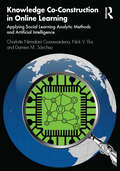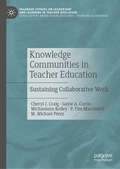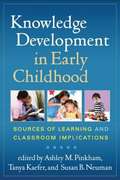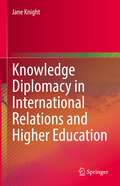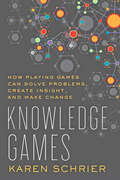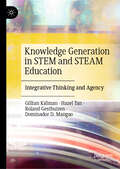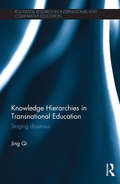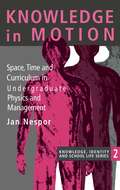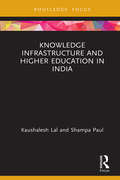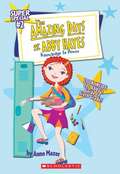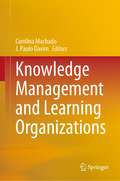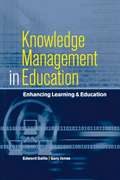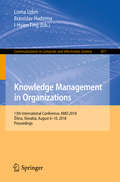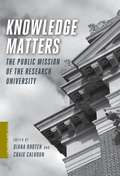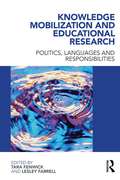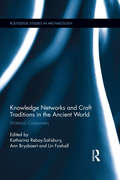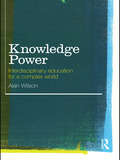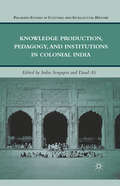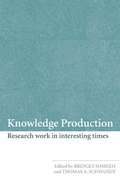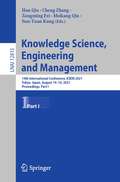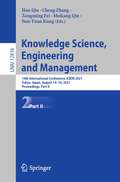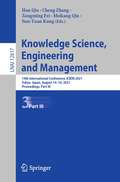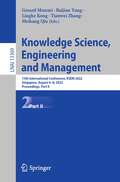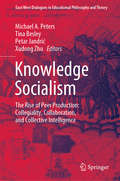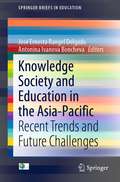- Table View
- List View
Knowledge Co-Construction in Online Learning: Applying Social Learning Analytic Methods and Artificial Intelligence
by Charlotte Nirmalani Gunawardena Nick V. Flor Damien M. SánchezKnowledge Co-Construction in Online Learning is a comprehensive, foundational resource that explores the study of social construction of knowledge through platforms, social dynamics, and other aspects of today’s technology-enhanced education. The interactive spaces, from formal computer-supported collaborative learning settings to informal social media-integrative environments, that comprise asynchronous online learning offer a rich source of data for analyzing teaching and learning. How, then, can researchers and designers in educational technology, instructional design, the learning sciences, and beyond most effectively analyze the content and data generated by these complex co-creations of knowledge?Grounded in sociocultural and social constructivist theories of learning and driven by the globally renowned Interaction Analysis Model, this book applies statistical and computational methods to study the group interactions and social networks that yield newly constructed knowledge during virtual learning experiences. Its unique Social Learning Analytic Methods enhance the analysis of social dynamics that support knowledge construction so often missing from mainstream learning analytics. Holistic and cyclical in its approach to online learning experiences, this essential volume written for novice and experienced researchers transcends the field’s research paradigm conflicts, blends qualitative and quantitative approaches with new digital media tools, and exemplifies how research questions and designs can incorporate and automate evolving forms of inquiry.
Knowledge Communities in Teacher Education: Sustaining Collaborative Work (Palgrave Studies on Leadership and Learning in Teacher Education)
by Cheryl J. Craig Gayle A. Curtis Michaelann Kelley P. Tim Martindell M. Michael PérezThis book traces the origins and activities of the longest-standing collaborative teacher group in education, the Portfolio Group. Each chapter documents, historically and conceptually, the main intellectual moments in the evolution of the idea of knowledge communities. Authors illuminate the expansive work, research, and the leading/learning influence that the Portfolio Group has had in the local education community as well as on the international education landscape. In doing so, they illustrate the journey of a school-based, cross-institutional knowledge community and provide the proverbial light at the end of the tunnel for so many novice and newly formed groups seeking sustainability. The book demonstrates through the shared experiences of five teachers/teacher educators the ways in which varied collaborations aimed at professional development lead to teacher growth in practice, leadership, and career.
Knowledge Development in Early Childhood
by Tanya Kaefer Ashley PinkhamSynthesizing cutting-edge research from multiple disciplines, this book explores how young children acquire knowledge in the "real world" and describes practical applications for early childhood classrooms. The breadth and depth of a child's knowledge base are important predictors of later literacy development and academic achievement. Leading scholars describe the processes by which preschoolers and primary-grade students acquire knowledge through firsthand experiences, play, interactions with parents and teachers, storybooks, and a range of media. Chapters on exemplary instructional strategies vividly show what teachers can do to build children's content knowledge while also promoting core literacy skills.
Knowledge Diplomacy in International Relations and Higher Education
by Jane KnightThis book addresses the understudied phenomenon of why and how contemporary international higher education, research and innovation can contribute to strengthening international relations. The author proposes the concept of knowledge diplomacy and carefully examines its fundamental rationales, actors, principles, instruments, and strategies. This is the first book that compares the similarities and differences between knowledge diplomacy and related terms such as soft power, cultural diplomacy, science diplomacy and public diplomacy to capture the expanding role of international higher education and research in bilateral and multilateral relations. The analysis of initiatives from around the world helps to ground and illustrate the key features of a knowledge diplomacy approach. "This book makes a highly original and important contribution to the study of knowledge diplomacy and soft power. It brings together the latest thinking and trends in the study of contemporary diplomacy and international higher education. The author is well known for the clarity and perspicacity of her definitions and analysis and this applies to her in-depth examination of knowledge diplomacy which she convincingly distinguishes from soft power and other forms of diplomacy. The discussion of issues and challenges which require further exploration and research will be valuable to international relations and international higher education scholars, policy makers and students.” Professor Ruth Hayhoe, University of Toronto, and President Emerita, the Education University of Hong Kong "This timely book offers a sound framework for studying the expanding role of higher education, research and innovation in international relations. A key strength is that viewpoints and experiences from all of the world’s regions have been included in this lucid, interdisciplinary contribution to our understanding of knowledge diplomacy.” Professor Jan Melissen, Leiden University and University of Antwerp, Editor-in-Chief The Hague Journal of Diplomacy “This is a must-read book for scholars, policy makers and diplomats who want to understand how international higher education, research and innovation can help to address the complexities of contemporary global challenges through knowledge diplomacy.". Professor Chika Sehoole, Pretoria University, South Africa
Knowledge Games: How Playing Games Can Solve Problems, Create Insight, and Make Change (Tech.edu: A Hopkins Series on Education and Technology)
by Karen SchrierAre games the knowledge-producers of the future?Imagine if new knowledge and insights came not just from research centers, think tanks, and universities but also from games, of all things. Video games have been viewed as causing social problems, but what if they actually helped solve them? This question drives Karen Schrier’s Knowledge Games, which seeks to uncover the potentials and pitfalls of using games to make discoveries, solve real-world problems, and better understand our world. For example, so-called knowledge games—such as Foldit, a protein-folding puzzle game, SchoolLife, which crowdsources bullying interventions, and Reverse the Odds, in which mobile game players analyze breast cancer data—are already being used by researchers to gain scientific, psychological, and humanistic insights.Schrier argues that knowledge games are potentially powerful because of their ability to motivate a crowd of problem solvers within a dynamic system while also tapping into the innovative data processing and computational abilities of games. In the near future, Schrier asserts, knowledge games may be created to understand and predict voting behavior, climate concerns, historical perspectives, online harassment, susceptibility to depression, or optimal advertising strategies, among other things.In addition to investigating the intersection of games, problem solving, and crowdsourcing, Schrier examines what happens when knowledge emerges from games and game players rather than scientists, professionals, and researchers. This accessible book also critiques the limits and implications of games and considers how they may redefine what it means to produce knowledge, to play, to educate, and to be a citizen.
Knowledge Generation in STEM and STEAM Education: Integrative Thinking and Agency
by Hazel Tan Gillian Kidman Roland Gesthuizen Dominador D. MangaoThis book examines how integrative practices are conceived, described, and taught within the context of STEA+M education. STEA+M education is far more than a disciplinary expansion of STEM education; it is a paradigmatic shift in educational purpose and practice, offering a framework for rethinking how knowledge is produced, whose voices are legitimised, and what purposes education serves. The authors argue that teachers must not only understand the knowledge and skills of a specialist discipline but also understand how to integrate and synthesise knowledge in a cross-disciplinary fashion between several disciplines simultaneously. For teachers to effectively integrate multiple educational domains, they must engage students in integrative STEA+M thinking practices such as inquiry-based learning, student agency, and neo-twenty-first century skills. This must occur not only within, but also across, disciplines in an integrated manner, whether this involves multi-, inter-, or trans-disciplinary approaches. This skill is defined as integrative inquiry literacy.
Knowledge Hierarchies in Transnational Education: Staging dissensus (Routledge Research in International and Comparative Education)
by Jing QiTransnational education seeks equivalence in standards and/or relevance of outcomes through the transfer of Western theories, concepts and methods. Utilising a critique-interpretative approach, Jing Qi argues that equivalence/relevance-oriented approaches to transnational education assume the legitimacy of the global knowledge hierarchy. Euro-American educational theories are imposed as defaults in non-Western educational communities of imagined consensus. Grounded in a study of a five-year transnational teacher education and community capacity-building program in Northern Chile, the book investigates the relationships between theoretical knowledge, knowledge hierarchies and critique. Transnational education communities are recognised as sites of critiques where conflictual and conceptual ‘dissensus’ disrupts global and local knowledge hierarchies. Critique is deployed by educational actors in their everyday engagement in transnational education to stage dissensus, which constantly re-draws the lines of possibility for knowledge co-construction. A matrix mapping system is designed to chart and theorise the Chilean educational actors’ critiques along the trail of concept translation, learning, application and innovation of knowledge hierarchies, which operate at and across global, transnational, local and the newly-created local-global levels. This book examines how these critiques modulate the ascendancy of knowledge hierarchies to enfranchise non-western educational actors for theoretical knowledge production that addresses local needs. Knowledge Hierarchies in Transnational Education will be of key value to researchers, academics and postgraduate students in the fields of international education, teacher education and globalisation.
Knowledge In Motion: Space, Time And Curriculum In Undergraduate Physics And Management
by Jan NesporUsing an analysis of learning by a case study comparison of two undergraduate courses at a United States University, Nespor examines the way in which education and power merge in physics and management. Through this study of politics and practices of knowledge, he explains how students, once accepted on these courses, are facilitated on a path to power; physics and management being core disciplines in modern society. Taking strands from constructivist psychology, post-modern geography, actor-network theory and feminist sociology, this book develops a theoretical language for analysing the production and use of knowledge. He puts forward the idea that learning, usually viewed as a process of individual minds and groups in face-to-face interaction, is actually a process of activities organised across space and time and how organisations of space and time are produced in social practice.; Within this context educational courses are viewed as networks of a larger whole, and individual courses are points in the network which link a wider relationship by way of texts, tasks and social practices intersecting with them. The book shows how students enrolled on such courses automatically become part of a network of power and knowledge.
Knowledge Infrastructure and Higher Education in India (Routledge Focus on Economics and Finance)
by Kaushalesh Lal Shampa PaulThis short book examines the availability and adoption of new education technologies in higher education institutions in India. It provides a summary of the activities in which such technologies are being used and the catalytic factors for such adoptions. The book also evaluates the impact on skill development, and will be a useful reference for those who are interested to find out more about technology adoption and implementation in higher education, and what the challenges are through the learning experiences in these education institutions.
Knowledge Is Power (The Amazing Days of Abby Hayes Super Special #2)
by Anne MazerAbby's starting sixth grade at last! She thinks she's ready for anything, until she makes a mortifying mistake on her very first day. Will Abby manage to make it better? Or will one mistake follow her through the rest of middle school?
Knowledge Management and Learning Organizations
by J. Paulo Davim Carolina MachadoThis book focuses on knowledge management and learning organizations, showing how they realise entrepreneurship and innovation. Understanding knowledge management as the process of creating, sharing and managing an organization’s information and knowledge, and focusing learning organizations in their collaborations to promote continuous learning are two issues that are critical to the organizational success. As such, this book offers insights into the topic and the appropriate use of the tools and strategies that drive competitive organizations operating on an international or transnational scale.
Knowledge Management in Education: Enhancing Learning & Education
by Gary Jones Edward SallisKnowledge Management (KM) is the technique of using the information and knowledge that is supplied to, generated by and inherent in any organization or institution, to improve its performance. This volume demonstrates how KM can be used in education to improve learning.
Knowledge Management in Organizations: 13th International Conference, KMO 2018, Žilina, Slovakia, August 6–10, 2018, Proceedings (Communications in Computer and Information Science #877)
by Lorna Uden I-Hsien Ting Branislav HadzimaThis book contains the refereed proceedings of the 13th International Conference on Knowledge Management in Organizations, KMO 2018, held in Žilina, Slovakia, in August 2018. The theme of the conference was "Emerging Research for Knowledge Management in Organizations."The 59 papers accepted for KMO 2018 were selected from 141 submissions and are organized in topical sections on: Knowledge management models and analysis; knowledge sharing; knowledge transfer and learning; knowledge and service innovation; knowledge creation; knowledge and organization; information systems and information science; knowledge and technology management; data mining and intelligent science; business and customer relationship management; big data and IoT; and new trends in IT.
Knowledge Matters: The Public Mission of the Research University (A Columbia / SSRC Book)
by Craig Calhoun Diana RhotenHigher education can be a vital public good, providing opportunities for students, informed citizens for democracy, and knowledge to improve the human condition. Yet public investment in universities is widely being cut, often because public purposes are neglected while private benefits dominate. In this collection, international scholars confront the realities of higher education and the future of its public and private agenda. Their perspectives illuminate the trajectory of education in the twenty-first century and the continuing importance of the university's public mission. Reporting from Asia, Africa, Europe, Latin America, and North America, these scholars look at the different ways universities struggle to serve public and private agendas. Contributors examine the implications of changes in funding sources as well as amounts, different administrative and policy decisions, and the significance of various approaches to assessment and evaluation. They ask whether wider student access has in fact resulted in social mobility, whether more scientific research can be treated as an open-access resource, how changes in academic publishing change access to knowledge, and whether universities get full value from research sold to private corporations. At the same time, these chapters capture the confusion in the university sector over explaining academic work to a broader public and prioritizing its multiple purposes. Authors examine these practical challenges and the implications of different approaches in different contexts.
Knowledge Mobilization and Educational Research: Politics, languages and responsibilities
by Tara Fenwick Lesley FarrellHow can educational research have more impact? What processes of knowledge exchange are most effective for increasing the uses of research results? How can research-produced knowledge be better ‘mobilized’ among users such as practicing educators, policy makers, and the public communities? These sorts of questions are commanding urgent attention in educational discourses and research policies now circulating around the world. This attention has been translated into powerful material exercises that shape what is considered to be worthwhile research and how research is funded, recognized, and assessed. Yet precisely what activities constitute effective knowledge mobilization, or even what is meant by ‘moving knowledge’, remains unclear. What politics are at play in determining knowledge ‘impact’ across radically different contexts? Who determines what counts as impact, and for what purposes? How are ‘results’ of educational research separated from its participants and processes? In addition knowledge mobilization also invokes debates about the languages through which knowledge is constructed, policy processes are enacted, and research unfolds. This volume is unique in bringing together these wide-ranging issues of knowledge mobilization in education. The volume editors critically analyse these complex issues and also describe various efforts of knowledge mobilization and their effects. While the contributors themselves speak from diverse material, occupational and theoretical locations. Leading scholars in Canada, the US, the UK, and Australia bring disciplinary perspectives from law, digital media studies, museum studies, journalism and policy-making as well as fields of education. Some speak from Anglo-‘Western’ perspectives but others such as Phan Le Ha (Vietnamese), Rui Yang (Chinese) and Dolores van der Wey (Haida/West Coat Salish First Nations) speak from Asian, Indigenous and diasporic locations.
Knowledge Networks and Craft Traditions in the Ancient World: Material Crossovers (Routledge Studies in Archaeology)
by Lin Foxhall Katharina Rebay-Salisbury Ann BrysbaertThis edited volume investigates knowledge networks based on materials and associated technologies in Prehistoric Europe and the Classical Mediterranean. It emphasises the significance of material objects to the construction, maintenance, and collapse of networks of various forms – which are central to explanations of cultural contact and change. Focusing on the materiality of objects and on the way in which materials are used adds a multidimensional quality to networks. The properties, functions, and styles of different materials are intrinsically linked to the way in which knowledge flows and technologies are transmitted. Transmission of technologies from one craft to another is one of the main drivers of innovation, whilst sharing knowledge is enabled and limited by the extent of associated social networks in place. Archaeological research has often been limited to studying objects made of one particular material in depth, be it lithic materials, ceramics, textiles, glass, metal, wood or others. The knowledge flow and transfer between crafts that deal with different materials have often been overlooked. This book takes a fresh approach to the reconstruction of knowledge networks by integrating two or more craft traditions in each of its chapters. The authors, well-known experts and early career researchers, provide concise case studies that cover a wide range of materials. The scope of the book extends from networks of craft traditions to implications for society in a wider sense: materials, objects, and the technologies used to make and distribute them are interwoven with social meaning. People make objects, but objects make people – the materiality of objects shapes our understanding of the world and our place within it. In this book, objects are treated as clues to social networks of different sorts that can be contrasted and compared, both spatially and diachronically.
Knowledge Power: Interdisciplinary Education for a Complex World
by Alan WilsonSuccess in the twenty-first century demands knowledge power – for individuals, organisations, cities, regions and countries. This book offers a map showing the structure of the knowledge space in a contemporary context. The routes beyond traditional disciplines are charted, in part based on the notions of superconcepts and superproblems. There are major implications for the development of education systems, particularly for universities but also for all employers as they seek to ensure that their organisations have the requisite knowledge to meet future challenges. In many instances, radical change is called for. The traditional disciplines and their future development are reviewed and systems concepts are introduced to develop an interdisciplinary framework for the future. The nature of the knowledge core for different kinds of organisation is outlined in the context of development strategies and management capabilities. Super concepts are introduced throughout and through these the reader is introduced to a range of authors who, it is argued, provide the signposts for the way ahead.
Knowledge Production, Pedagogy, and Institutions in Colonial India
by Indra Sengupta Daud AliThis volume seeks to revise the Saidian analytical framework which dominated research on the subject of colonial knowledge for almost two decades, which emphasized colonial knowledge as a series of representations of colonial hegemony. It seeks to contribute to research in the field by analyzing knowledge in colonial India as a dynamic process.
Knowledge Production: Research Work in Interesting Times
by Thomas A. Schwandt Bridget SomekhThis collection from a highly impressive international group of educational researchers explores epistemological, methodological, and ethical-political issues in the production of knowledge about educational phenomena in contemporary society. The book is organized in two sections. The first focuses on how the enterprise of knowledge production is being influenced by global discourses of educational accountability, evidence-based practice and policy, and quality assessment. The second section features material that focuses more specifically on reconceiving both methodological matters and the kinds of knowledge that demand attention in this climate. The book is unique in bringing together chapters by scholars well-known internationally for their original contributions to educational theory and research practice. Many books in this area are no more than guides on how to do research or text books reiterating rather narrow frameworks of research paradigms, this book both breaks new ground and sets the tone for discussions about the future path of educational research in the coming years.
Knowledge Science, Engineering and Management: 14th International Conference, KSEM 2021, Tokyo, Japan, August 14–16, 2021, Proceedings, Part I (Lecture Notes in Computer Science #12815)
by Meikang Qiu Han Qiu Cheng Zhang Zongming Fei Sun-Yuan KungThis three-volume set constitutes the refereed proceedings of the 14th International Conference on Knowledge Science, Engineering and Management, KSEM 2021, held in Tokyo, Japan, in August 2021.The 164 revised full papers were carefully reviewed and selected from 492 submissions. The contributions are organized in the following topical sections: knowledge science with learning and AI; knowledge engineering research and applications; knowledge management with optimization and security.
Knowledge Science, Engineering and Management: 14th International Conference, KSEM 2021, Tokyo, Japan, August 14–16, 2021, Proceedings, Part II (Lecture Notes in Computer Science #12816)
by Meikang Qiu Han Qiu Cheng Zhang Zongming Fei Sun-Yuan KungThis three-volume set constitutes the refereed proceedings of the 14th International Conference on Knowledge Science, Engineering and Management, KSEM 2021, held in Tokyo, Japan, in August 2021.The 164 revised full papers were carefully reviewed and selected from 492 submissions. The contributions are organized in the following topical sections: knowledge science with learning and AI; knowledge engineering research and applications; knowledge management with optimization and security.
Knowledge Science, Engineering and Management: 14th International Conference, KSEM 2021, Tokyo, Japan, August 14–16, 2021, Proceedings, Part III (Lecture Notes in Computer Science #12817)
by Meikang Qiu Han Qiu Cheng Zhang Zongming Fei Sun-Yuan KungThis three-volume set constitutes the refereed proceedings of the 14th International Conference on Knowledge Science, Engineering and Management, KSEM 2021, held in Tokyo, Japan, in August 2021.The 164 revised full papers were carefully reviewed and selected from 492 submissions. The contributions are organized in the following topical sections: knowledge science with learning and AI; knowledge engineering research and applications; knowledge management with optimization and security.
Knowledge Science, Engineering and Management: 15th International Conference, KSEM 2022, Singapore, August 6–8, 2022, Proceedings, Part II (Lecture Notes in Computer Science #13369)
by Meikang Qiu Linghe Kong Gerard Memmi Baijian Yang Tianwei ZhangThe three-volume sets constitute the refereed proceedings of the 15th International Conference on Knowledge Science, Engineering and Management, KSEM 2022, held in Singapore, during August 6–8, 2022. The 169 full papers presented in these proceedings were carefully reviewed and selected from 498 submissions. The papers are organized in the following topical sections:Volume I:Knowledge Science with Learning and AI (KSLA)Volume II:Knowledge Engineering Research and Applications (KERA)Volume III:Knowledge Management with Optimization and Security (KMOS)
Knowledge Socialism: The Rise of Peer Production: Collegiality, Collaboration, and Collective Intelligence (East-West Dialogues in Educational Philosophy and Theory)
by Michael A. Peters Xudong Zhu Petar Jandrić Tina BesleyThis is the first collection focusing on knowledge socialism, a particularly apt term used to describe a Chinese socialist mode of production and socialist approach to development and modernity based around the rise of peer production, new forms of collaboration and collective intelligence. Making the case for knowledge socialism, the book is intended for students, teacher, scholars and policy theorists in the field of knowledge economy.
Knowledge Society and Education in the Asia-Pacific: Recent Trends and Future Challenges (SpringerBriefs in Education)
by José Ernesto Rangel Delgado Antonina Ivanova BonchevaThis book explores recent trends in the knowledge-based society and education field in Asia-Pacific and discusses future challenges in the region. It presents studies on the development of scientific thought in the field on the knowledge-based society in the Pacific Circle. This book explores the theoretical framework of the knowledge-based society framed by the borders imposed by the Pacific Ocean, particularly from the perspective of the Pacific Circle Consortium (PCC), in the face of a paradigm shift to satisfy the human needs that must be preserved to guarantee economic and human conditions that future development requires. It analyzes how education relates to the knowledge society in the Asia Pacific region, and considers global issues such as environmental degradation, climate change, pollution, soil erosion, growth of the population. It discusses how these issues concerns parents, educators, civil societies and governments of the countries around the Pacific Circle. This book explores the necessity of changing the current transformative paradigm to one that ensures environmental sustainability, with the support of scientific education and research, as an issue that must be integrated into the curricula in schools at all educational levels.
